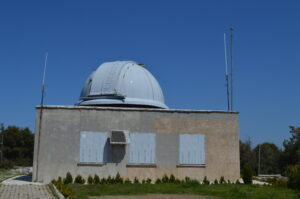- prev
- next
Description
Ege University:
Ege University, Turkey's fourth established university, was founded under Law No. 6595 on May 20th, 1955, with its educational operations commencing on November 5th of the same year. Its inaugural faculties were Medicine and Agriculture, along with the School of Nursing, all established in 1955. Over the subsequent two decades, Ege University rapidly expanded by adding new faculties, institutions, and schools at various intervals.

In 1982, the university underwent a reorganization resulting in the establishment of Dokuz Eylül University, facilitated by the transfer of several existing faculties and graduate schools. Furthermore, faculties and graduate schools from Ege University's various branches became the founding institutions of Afyon Kocatepe University, Pamukkale University, Celal Bayar University, and Adnan Menderes University.
As of 2023, Ege University boasts a comprehensive academic structure comprising 19 faculties, 9 institutes, 3 graduate schools, 1 State Conservatory of Turkish Music, 10 vocational schools, 6 rectorate units, and 40 application and research centers.
In the academic year 2022-2023, Ege University enrolled a total of 56,404 students, consisting of 48,211 undergraduate and associate degree students, along with 8,193 postgraduate students. The university employs 3,283 academic staff and 7,070 administrative staff.
Ege University has developed a robust research infrastructure, highlighted by prestigious centers such as the Research and Application Center of Drug Development and Pharmokinetics, Environment and Food Analysis Laboratory (ARGEFAR), Petroleum Analysis Laboratory (EGEPAL), MATAL (Application and Research Center of Central Research Test and Analysis), FABAL (Pharmaceutics Research Laboratory), BESTMER (Biological Energy Systems and Technology Center), Ege University Research and Application Center of Textile and Apparel Manufacturing (TEKAUM), and a total of 896 laboratories spread across its academic units and research centers.
Since its inception, Ege University has prioritized scientific contributions on a global scale, emphasizing the production of high-quality knowledge and the education of culturally aware and productive researchers. The university places a strong emphasis on social benefit and knowledge transfer, fostering collaborations with industry, state entities, and research and development organizations. Ege University is recognized internationally for its commitment to innovative education, research, and its unique approach to interdisciplinary engagement, entrepreneurship, and information dissemination, aligning with the principles of the Fourth Generation University Concept.
Quick Facts About Ege University:
| Aspect | Details |
|---|---|
| Founded | 1955 |
| Establishment Law | Law No. 6595 issued on May 20th, 1955 |
| First Faculties | Faculty of Medicine, Faculty of Agriculture, School of Nursing |
| Restructuring | In 1982, led to the creation of Dokuz Eylül University and other universities |
| Academic Units | 19 Faculties, 9 Institutes, 3 Graduate Schools, 10 Vocational Schools |
| Additional Units | 1 State Conservatory of Turkish Music, 6 Rectorate Units, 40 Application and Research Centers |
| Total Students (2022-2023) | 56,404 (48,211 undergraduate/associate degree, 8,193 postgraduate) |
| Academic Staff | 3,283 |
| Administrative Staff | 7,070 |
| Notable Research Infrastructure | Research and Application Center of Drug Development and Pharmokinetics, Environment and Food Analysis Laboratory (ARGEFAR), Petroleum Analysis Laboratory (EGEPAL), Ege Teknopark Technology Development Zone, and various other laboratories |
| Educational Focus | Emphasis on global scientific contributions, interdisciplinary collaboration, innovation, and knowledge transfer |
| Concept | Represents the Fourth Generation University Concept |
Faculties:
- Faculty of Medicine
- Faculty of Agriculture
- Faculty of Science
- Faculty of Engineering
- Faculty of Pharmacy
- Faculty of Dentistry
- Faculty of Letters
- Faculty of Economics and Administrative Sciences
- Faculty of Fisheries
- Faculty of Education
- Faculty of Fine Arts
- Faculty of Law
- Faculty of Communication
- Faculty of Nursing
- Faculty of Theology
- Faculty of Architecture
- Faculty of Health Sciences
- Faculty of Vocational Education
- Faculty of Applied Sciences
Why Study MBBS at Ege University / Advantages of studying in Ege University?
- Accreditation and Recognition: Ege University's Faculty of Medicine is accredited by the Turkish Ministry of Health and recognized internationally. This ensures that the education provided meets global standards and facilitates practice in various countries.
- Multidisciplinary Approach: The medical curriculum at Ege University emphasizes a multidisciplinary approach, integrating basic sciences with clinical practice. This holistic approach prepares students to address complex medical challenges effectively.
- Clinical Rotations: Ege University offers extensive clinical rotations in affiliated hospitals, providing students with exposure to diverse medical specialties and patient populations. This hands-on experience enhances clinical skills and fosters professional development.
- International Student Community: Ege University attracts a diverse student body from around the world, creating a multicultural learning environment. Interacting with peers from different backgrounds enriches the educational experience and promotes cross-cultural understanding.
- Opportunities for Specialization: Ege University offers pathways for specialization within various medical disciplines. Students can pursue further training and specialization after completing their MBBS, enhancing career opportunities.
- Research and Innovation: The university encourages student participation in research activities and innovation initiatives. Students have access to state-of-the-art laboratories and research centers, fostering a culture of scientific inquiry and discovery.
- Language of Instruction: While Turkish is the primary language of instruction, Ege University offers language support and preparatory courses for international students. This facilitates academic success and integration into the local community.
- Career Support Services: Ege University provides career support services, including internships, networking events, and job placement assistance. The university's strong reputation enhances employment prospects both nationally and internationally.
- Cultural Enrichment: Studying at Ege University allows students to experience Turkish culture firsthand, including rich traditions, cuisine, and historical landmarks. This cultural immersion enhances personal growth and global awareness.
- Quality of Life: Located in Izmir, a vibrant city on Turkey's Aegean coast, Ege University offers a high quality of life with affordable living costs. Students enjoy access to beaches, cultural attractions, and a lively social scene.
These unique aspects of studying MBBS at Ege University contribute to a fulfilling and enriching educational experience, preparing students for successful careers in medicine while fostering personal and professional growth.
Eligibility
Eligiblity Criteria:
- Educational Qualifications:
- Completion of a recognized board's higher secondary examination or equivalent competent test.
- Minimum Grades:
- Attainment of a minimum of 75% and above in Physics, Chemistry, Biology, and English in the 10+2 examination.
- Age Requirement:
- The candidate must be at least 17 years old at the time of admission.
- NEET Score:
- Indian applicants must obtain a qualifying score in the National Eligibility cum Entrance Test (NEET) to be eligible for admission.
Admission Process:
- Check Eligibility: Ensure you meet the eligibility criteria set by Ankara University, including educational qualifications, minimum grades, age requirements, and NEET score.
- Research Programs: Explore the undergraduate or graduate programs offered by Ankara University and select the one that aligns with your academic and career goals.
- Application Form: Fill out the university's online application form for international students, providing accurate personal and academic information.
- Submission of Documents: Gather and submit the required documents, which may include:
- Academic transcripts and certificates.
- Passport or identification documents.
- NEET scorecard.
- Language proficiency test scores (if applicable).
- Letters of recommendation.
- Statement of purpose or personal statement.
- Any other supporting documents specified by the university.
- Pay Application Fee: Pay the application fee as per the university's guidelines. Ensure all fees are paid within the specified deadlines.
- NEET Score Verification: Ensure that your NEET score meets the minimum requirements set by Ankara University for Indian applicants.
- Application Review: The university will review your application, including academic qualifications, test scores, and supporting documents.
- Admission Decision: Wait for the admission decision from Ankara University. Successful applicants will receive an offer of admission, while others may be placed on a waitlist or receive a rejection.
- Acceptance and Enrollment: If accepted, follow the instructions provided by the university to accept the offer of admission and complete the enrollment process, including payment of tuition fees and submission of any required documents.
- Visa Application: Apply for a student visa to study in Turkey. Follow the visa application process set by the Turkish consulate or embassy in your country.
- Travel and Arrival: Once you have obtained your student visa, make travel arrangements to Turkey and ensure a smooth arrival at Ankara University for the start of your academic program.
It's important to note that the specific requirements and procedures may vary, so applicants should carefully review the university's official website or contact the Education Zone Team directly for detailed instructions and assistance throughout the application process.
Fees structure
| Tuition Fee for Newly Registered Students in the 2023-2024 Academic Year within the Quota for Foreign Student Admission |
|
| Graduate School/Faculty/High School/Vocaitonal High School |
Tuition Fee (USD) (Year) |
| Faculty of Medicine | $10.000,00 |
| Faculty of Dentistry | $10.000,00 |
| Faculty of Pharmacy | $8.450,00 |
| Faculty of Nursing | $4.500,00 |
| Faculty of Health Sciences | $3.000,00 |
| Faculty of Fine Arts, Design and Architecture | $2.000,00 |
| Faculty of Fashion and Design | $3.076,00 |
| Faculty of Economics and Administrative Science | $3.000,00 |
| Faculty of Economics and Administrative Science (Evening Education) |
$3.500,00 |
| Fauclty of Engineering | $3.450,00 |
| Faculty of Agriculture | $2.000,00 |
| Faculty of Science | $1.000,00 |
| Faculty of Letters | $1.000,00 |
| Faculty of Communication | $1.000,00 |
| Faculty of Education | $1.000,00 |
| Çeşme Faculty of Tourism | $1.000,00 |
| Ege Vocational High School | $2.000,00 |
| Faculty of Fisheries | $2.919,00 |
| Faculty of Sport Sciences | $770,00 |
| Faculty of Sport Sciences (Evening Education) | $1.000,00 |
| Ödemiş Faculty of Health Sciences | $1.000,00 |
Hostel
Ege University provides various accommodation options and facilities to cater to the needs of its students. Here's an overview of the hostels and facilities available at Ege University:
- Student Dormitories: Ege University offers on-campus student dormitories located conveniently close to academic buildings and facilities. These dormitories provide affordable accommodation options for both local and international students. The dormitories are well-maintained and offer various room types (single, double, shared) to suit different preferences.
- Amenities in Dormitories: The student dormitories at Ege University are equipped with essential amenities such as beds, study desks, wardrobes, and shared bathroom facilities. Common areas such as lounges, kitchens, and laundry rooms are available for students' convenience.
- Off-Campus Housing: In addition to on-campus dormitories, Ege University assists students in finding suitable off-campus housing options near the university. The university's housing office provides information and support to students looking for private accommodation.
- Facilities and Services: Apart from accommodation, Ege University offers a range of facilities and services to enhance student life:
- Dining Facilities: On-campus cafeterias and dining halls provide affordable meals and refreshments.
- Sports Facilities: The university campus features sports complexes, gyms, and outdoor sports fields for recreational activities and fitness.
- Libraries: Ege University libraries offer extensive collections of academic resources, study spaces, and computer facilities.
- Health Services: The university has health clinics and medical services on campus to cater to students' healthcare needs.
- Student Clubs and Activities: Ege University supports various student clubs and organizations that organize cultural events, workshops, and extracurricular activities.
- Campus Environment: Ege University's campus is designed to create a conducive learning environment. It features green spaces, walking paths, and modern infrastructure to facilitate academic and social interactions among students.
- Safety and Security: The university prioritizes the safety and security of its students. Security personnel and surveillance systems are in place to ensure a safe living and learning environment.
Ege University's hostels and facilities aim to provide students with comfortable living arrangements, access to essential amenities, and opportunities for personal and academic growth within a supportive campus community. Students can benefit from a well-rounded university experience while focusing on their academic pursuits.




